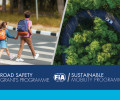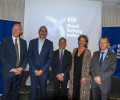Jean Todt speaks at the opening of the International Transport Forum 2018 Summit in Leipzig
At the opening plenary of the 2018 ITF Summit on Transport Safety and Security, FIA President emphasised that increased resources and funding are much-needed to tackle the road safety challenge and called for contributions to the newly created United Nations Road Safety Trust Fund. Read his full speech below.

President of the International Transport Forum and Minister for Transport of Latvia, dear Uldis AUGULIS,
Secretary General of ITF, dear Young TAE KIM,
Federal Minister for Transport of Germany, dear Andreas SCHEUER,
Dear Commissioner Violeta BULC,
Your Royal Highness Prince Michael of KENT,
Ministers,
Ladies, Gentlemen,
Let me start by thanking His Royal Highness Prince Michael of Kent for his kind words. I believe it is just fair to say we are now advancing on a path he started charting many years ago, and whatever progress achieved so far is a testimony to his vision. At the same time, the path ahead of us is still long, and demands our steadfast commitment.
It is a great pleasure to be with you all today in Leipzig, during this important Summit on safe and secure transport for the 21stcentury. Leipzig has become a must for all those thinking about the future of mobility.
And for me, the future of mobility can be summed up in three words: safer, cleaner, smarter.
As safety is the first pillar of this vision, I would like to start by briefly reminding everyone here today of the impact road safety has on sustainable development around the world.
According to the World Health Organization (WHO), road traffic crashes are one of the world’s leading causes of death, with 3,500 lives per day, 500 of which are children. Low-and middle-income countries the most affected by this public health crisis, accounting for 90% of global road traffic fatalities.
In addition to this tragic loss of life, road crashes have a staggering economic impact, robbing the global economy of more than US$500 billion every year and costing some countries up to 5 percent of GDP.
The outlook is even more startling when we take into account increasing urbanization trends. According to UN figures, 66 percent of the global population will live in urban areas by 2050.
If no changes are made, this spike in urbanization will come with an increase in the number of motor vehicles and, sadly, an increase in road traffic fatalities. No longer can we accept this situation.
In response, the international community is taking action. To tackle this global public health crisis, in 2010, the UN General Assembly officially proclaimed the Decade of Action for Road Safety, with the overarching goal to stabilize and reduce road traffic deaths around the world by 2020.
Global road safety received a further boost with two targets in the UN Sustainable Development Goals. In particular, target 3.6 of the SDGs has us committed to halving the 1.25 million deaths on world’s roads every year by 2020.
Target 11.2 also provide access by 2030 to safe, affordable, accessible and sustainable transport systems for all, improving road safety, notably by expanding public transport, with special attention to the needs of those in vulnerable situations, women, children, persons with disabilities and older persons.
I can only be honest – it is very unlikely that we can achieve the 2020 target.
But we must do everything we can to achieve it at the nearest possible horizon, and I concur that it should be no later than 2030. Strong commitment from political leaders is crucial; they need to focus on improving road safety based on the ‘Safe System Approach’.
This means a commitment to effective legislation, which is properly enforced, safer roads, vehicles and drivers, and better post-crash care.
We have seen in high-income countries, such as Latvia, for example, that progress is possible when such measures are implemented for the safety of all users.
As FIA President, I launched one year ago the #3500LIVES campaign, an unprecedented international road safety prevention campaign, already broadcast in several languages in 900 cities in 80 countries. I hope all of you have seen the banners downstairs and around the city of Leipzig…
For over two years now, the FIA High Level Panel for Road Safety, a high level consultative group bringing together economic decision-makers and stakeholders in the international community, has actively campaigned for an international mobilization. The HLP group of experts met here in Leipzig yesterday and I greet them warmly.
As many of you are aware, I also have the honour to be appointed the UN Secretary-General’s Special Envoy for Road Safety.
My mandate in this role covers four priorities:
- Supporting global partnerships to improve road safety, with a focus on funding,
- Advocating with governments, civil society and the private sector to promote road safety,
- Participating in global and regional conferences and meetings on road safety,
- And advocating the accession to, and more effective implementation of, UN road safety legal instruments.
Almost one billion people live in countries that have not acceded to any of the UN road safety conventions. The ratification and implementation of these agreements by more countries around the world is critical and I work with governments to this end.
For this mission, I am supported by UNECE, other United Nations Agencies and international organizations, like World Bank. And working together, we have had some significant achievements.
But much more remains to be done. There is another crucial point: under-financing represents a significant obstacle to meeting road safety targets, especially for developing countries.
AIDS, tuberculosis or malaria generate up to 1,000 times more financial aid than road safety, yet they all share similar fatality rates. While these other worthwhile causes are able to generate billions of dollars in funding every year, road safety remains far behind.
But recently, things have changed. Last 12 April in New York, road safety has won a major battle with the decision of the UN Secretary General António Guterres to establish a United Nations Road Safety Trust Fund.
It will contribute to closing the significant funding gap between road safety and other global public health issues.
Dear friends,
Millions of lives are at stake. The launch of this UN Road safety Trust Fund is a major step forward. There is now an urgency to mobilize financial resources. I therefore call on all stakeholders, UN Member States and partners, to contribute to this fund.
The first donors are the FIA Foundation, the Total Group and 3M. Many thanks to them. But this has to be just the beginning.
Every country that succeeded in working its way out of the road safety crisis must now take its share in helping the ones which are still struggling.
Every large corporation that stands to benefit from safer global mobility must help make it happen.
And anyone else who believes saving lives is a priority is welcome to contribute.
This is my priority.
And that's what I came to ask you.
Thank you for your attention.

 Facebook
Facebook Twitter
Twitter






